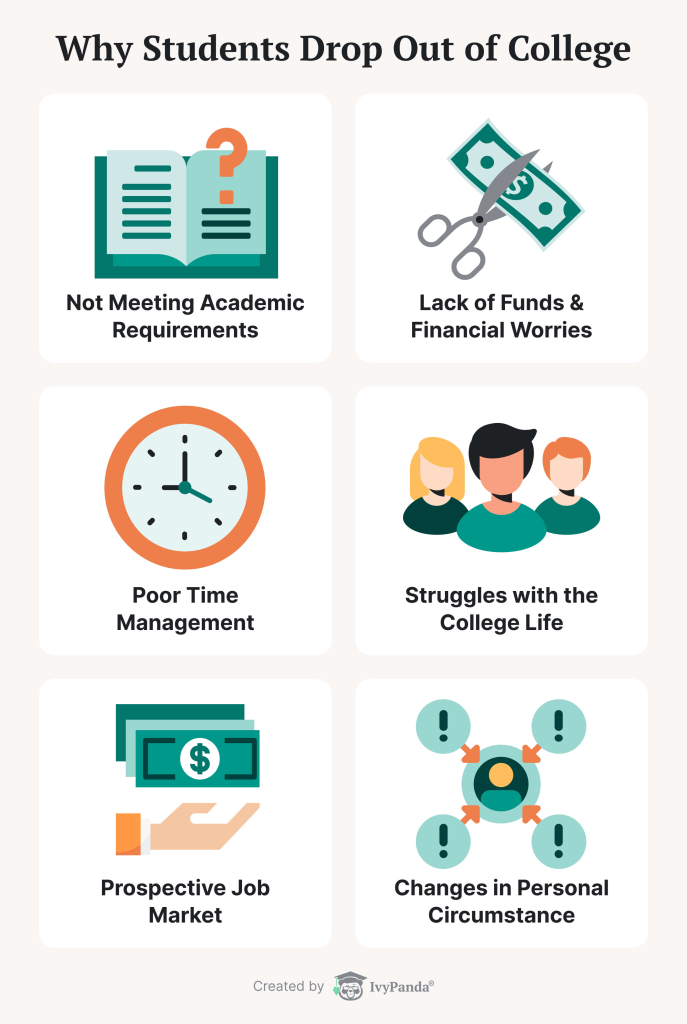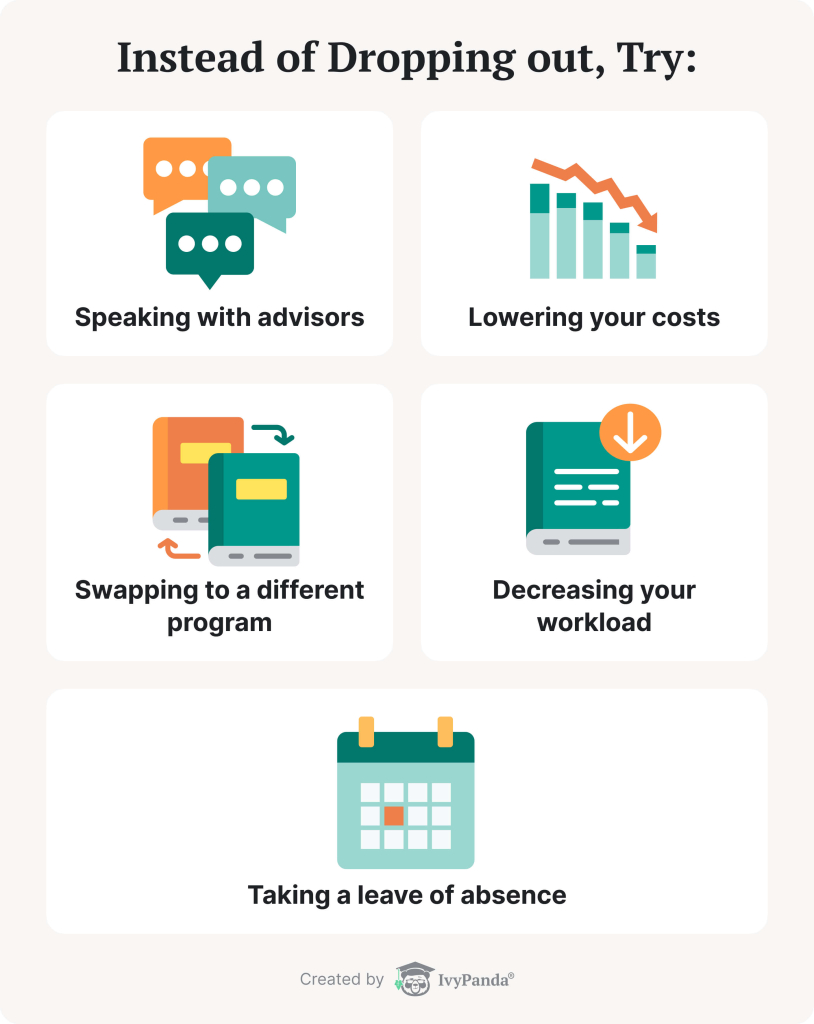Dropping out of college is a significant decision that many students might face for numerous reasons: financial struggles, personal challenges, a shift in professional goals, etc. It is essential to note that the choice to leave higher education comes with both advantages and drawbacks. Understanding the pros and cons of dropping out of college will assist a lot with this life-changing episode.
In this article, IvyPanda experts will discuss:
- Common reasons why people drop out of college
- How to drop out of college responsibly
- Pros and cons of leaving college
- Advice for those considering alternative paths
- Steps to take after dropping out
If you’ve already dropped out, you might ask, “Dropped out of college, now what?” Read this guide and find practical solutions and strategies for navigating life after leaving college.
📉 Dropping out of College: Facts & Rates
At first glance, you might think that dropping out of college is a personal failure. However, the statistics show us that this is not the case. In fact, almost a third of students decide to terminate their education prematurely. This number varies when you look at factors like income, age, race, etc. Let’s take a closer look at the statistics:
- The USA has the 19th highest dropout rate among the 28 countries included in the OECD research. The percentage of students who decide to graduate is only 40%.
- Nearly 32% of students prioritized family or personal problems and ended their college education prematurely.
- According to research data, only 36% of students aged 25 and older receive a college degree.
- Students who enroll after the age of 20 have a higher dropout rate – between 13% and 22% higher than students aged 20.
- The dropout rate for first-generation students with low income is about 89%. However, among second-generation students, this rate decreases around four-fold.
- The chance of dropout increases for students over the age of 20 during their 2nd and 4th years of study.
- The educational level of a parent can influence a student’s choices. Approximately 40% of students who drop out of college have parents who don’t have a college degree.
- About 36% of Alaska Natives or American Indians drop out within 2 years of attending 4-year colleges.
- Around 55% of Hispanics and 62% of African-Americans drop out of college within 6 years. However, only about 38% of white students do the same.
- Pacific Islanders and Black students drop out more often than Hispanic students.
- The lowest dropout rate is 10%, which belongs to Asian students at 4-year colleges. For Asian students at 2-year colleges, the dropout rate is about 35%.
- According to a study of six academic years, the average dropout rate showed that female students dropped out 4% less often than male students.
- Statistically, students are more likely to drop out of for-profit institutions than non-profit and public institutions for 4-year college degrees.
✏ Reasons for Dropping out of College
The idea of dropping out of college can come up for a variety of reasons. For example, some students cannot cope with the academic workload, while others are forced to interrupt their studies for health reasons. In this section, we’ll look at the most relevant reasons why students may quit their education early.

Failing to Meet Academic Requirements
About 28% of students who leave college early may do so because of a failure to meet academic requirements. This usually happens because students are unprepared for the heavy workload of college courses. Even students who did well in high school struggle with completing college tasks. The overall statistics are shocking!

First-year students may feel confused about assignments and frustrated about working with large amounts of material. As a rule, new information is introduced quickly, so students need to be prepared and focused. However, many experience difficulties in their exams and tests. Under such conditions, it’s not surprising that young people often suffer from stress and anxiety. In order to protect their mental health, many students decide to drop out because they were not able to find a balance between study, work, self-development, recreation, and their personal life. Student life is complicated and full of challenges that are not easily overcome.
Lack of Funds
One of the most widespread reasons that students drop out of college is the lack of financial resources. Almost 35% of all college students experience financial difficulties. Therefore, many students must work, sometimes even full-time, which leaves little time for academic responsibilities or mental health. Even if a student had the opportunity not to pay tuition, the following issues would still be in question: housing, study materials, meals, and extra expenses. On top of that, some young people may already have a family that they need to support. Given this situation, it’s difficult to consider taking out a student loan and spending years repaying it.

According to the US News rankings, the average cost of college tuition for the 2021 and 2022 academic years reached approximately $22,000 for public colleges and $38,000 for private colleges. Costs can vary significantly, however, because the statistics don’t include personal expenses. In the case of a bachelor’s degree, the situation is much more dire. Tuition ranges between $102,000 all the way to $215,000. College expenses are so high that 29% of students who have already dropped out of college cannot re-enroll because they can’t afford it.
Poor Time Management
How well do you manage your time? It’s crucial to create good time management habits in your life. After all, when teenagers live at home, their parents often help them manage their time. When we go off to college, probably for the first time, we are given unlimited control over what, when, and how we do things – from bedtimes to deadlines. Students can become infatuated with this power, mismanage their time, and face unfortunate consequences, including debt, health problems, sleep disturbances, and missed classes.
You should be aware that higher education is a multi-year commitment that requires serious dedication.
Scheduling is vital, especially at first. College life is extremely hectic, and you need to schedule your activities weeks in advance. This abrupt shift to a more independent life carries a lot of responsibility. Those students who are not up to the challenge often feel the pull to drop out of school. About 4% of students who don’t live on campus leave college for good. The longer the commute to school, the more likely a student is to drop out.
Struggles with the College Life
Adjusting socially to a new environment is just as important as having breakfast in the morning. Going to college is another transitional period with not only new surroundings but also new faces, too. Even those students who were very popular in high school blend in with the crowd because everyone is a newcomer. It can be difficult to find like-minded people to befriend. Moreover, not everyone is lucky enough to live with a roommate who shares the joys and sorrows of your new adventures.

Additionally, if this is a student’s second attempt at a degree, they may experience discomfort while communicating with younger people because of the differences in values and life experience. They could also feel like an outsider who lost their chance at an education. In these cases, deciding to drop out is understandable, since loneliness, self-doubt, and melancholy are destructive to the learning process.
Booming Job Market
The global service market is evolving, and the job market’s diversity is developing along with it. This trend attracts students away from higher education with the temptation to earn money here and now. This argument becomes especially convincing because of all the trials young people face. Almost 31% of students prefer a job over education so that can build their financial stability. The same factor motivates students to leave college if they are unsure of their professional choice. They might enter the job market to find a paying job now instead of investing their money into an uncertain future.
Factors such as physical and psychological health problems, unemployment, inflation, and the impact of COVID-19 are changing the lives of young people. These global crises often convince students that earning money is a better option than studying.
Online learning has gained popularity in recent years, but this format has already shown its shortcomings. Online students don’t take their studies as seriously; they are less motivated and less engaged academically. As a result, these students often drop out of college and look for full-time jobs. Other students – about 28% of them – leave college with the intention of being entrepreneurs.
Changes in Personal Life
One of the most unpredictable factors that pushes students to drop out are their personal circumstances. After all, no one can predict when an important event will occur. Perhaps a student is very affected by the illness of a relative, the birth of a child, a loved one’s new career opportunities, the end of a relationship, etc. At these moments, academic goals fade against the background of life challenges.
Our resources are not infinite, neither physically nor emotionally. A student’s choices depend on their resources and priorities.
In addition, some young people face challenges at traditional institutions. Not all colleges meet the appropriate requirements for non-traditional students. The statistics prove that about 73% of non-traditional students attending U.S. institutions of higher education drop out. It’s only natural to prioritize your personal comfort, health, and the health of your friends and family.
🎈 Is Dropping out the Only Option?
Before you make the decision to drop out, it’s worth asking yourself one crucial question: Is dropping out the only option? In this situation, you’ll need to think about the potential alternatives and weigh the pros and cons. We’ll focus on those questions in this section.
So, what options do you have besides leaving college early?

- Speaking with advisors and student unions.
Discuss your choice with other people. You can contact the student union and consult with an education specialist or social services specialist. They can provide you with helpful information and address your concerns about studying. You’ll receive instructions for possible actions that will lead you to a decision. - Lowering the costs.
We encourage you to try lowering your college costs. If you choose a less expensive alternative, you can continue to obtain your desired degree without any issues. Perhaps you could transfer to a state or municipal college, where you’ll still receive an adequate education. Many employers pay attention to your specialty, degree, or work experience and not necessarily the name of the institution itself. - Swapping to a different program.
This is an option for those who would like to keep studying but want to change their program. Some universities may give you the option to change your courses. We recommend checking out programs with similar subjects, since this will increase the possibility of transferring your credits. You can discuss this with your student counselor, but don’t wait too long. After all, you should choose before the tuition withdrawal date to avoid losing money and opportunities.Swapping to a different program. - Decreasing your workload.
Reducing your academic workload will have a favorable effect on your mental and physical well-being. If you don’t have time for essays or term papers, ask for assistance from an academic help service or a student union. Also, you can reduce the number of hours you attend classes or even cut back on the number of courses you take. Another option is to switch to a part-time program and combine your work with your studies. This way, you can earn money and gain experience while you continue your education. - Taking a leave of absence or deferring.
Academic leave can be a reasonably effective solution. Ask for permission to take a one-year break from school. By doing so, you’ll have the opportunity to go back to school without having to re-enroll. Alternatively, you can leave the institution for a few years, gain some life experience, and enroll again once you are older and more financially stable. You might be more motivated and you’ll have a better understanding of what you want out of your education.
Pros and Cons of Dropping out of College
If you’ve looked at all the alternatives and are still unsure, we suggest you weigh the pros and cons. These items will look different for each person, so you’re better off making these lists on your own. However, we will give you an example of how to do one. Below, we have described a few general points that are likely to be relevant to any student.
Pros
Cons
💡 How to Quit College the Smart Way
Has no alternative worked out for you? Did the pros of dropping out outweigh the cons? Are you ready to say goodbye to college life? If you have answered “yes” to all these questions, then you can start planning your next steps in life. Naturally, you cannot simply stop going to classes, since this can have unpleasant consequences. Instead, we are going to tell you how to quit your studies the smart way.

Step 1: Be confident and honest.
We’ve mentioned this several times, but it is important to emphasize again – be completely certain about your decision to leave college. If you are not, you might regret it later in life. However, if you have made up your mind, you need to be honest with yourself and others. Tell your friends or family about your decision as soon as possible. Hiding your choice will only result in more stress.
Step 2: Read through the withdrawal policies.
Once you are certain about your decision, you will have to examine the withdrawal policies of your institution. You will need to sign all the necessary forms, state your intention to leave to the correct authorities, and announce an official withdrawal date. Start with the registrar, visit the office for financial aid, or talk to your advisor.
Step 3: Consider your transcript.
Your transcript is one of the main reasons you should file an official withdrawal form instead of just quitting classes. If you just stop going to class, your grades will plummet, which will reflect poorly on your achievements thus far. However, by withdrawing, you will keep your transcript unaffected if you ever want to continue your educational journey. It is always better to leave college at the end of a semester, if this option is available to you.
Step 4: Think about your financial obligations.
Your financial situation after dropping out of college depends on several factors. One of them is whether you are paying tuition or have a student loan. Another is the date of your withdrawal. If you do have a loan and have completed less than 60% of your course, your institution will return some of the money you have borrowed. Therefore, you will have less to pay back. Sometimes, you may be required to pay the tuition fees for the rest of the academic year. In other cases, you may be refunded some of the tuition. It is also important to consider any grant or scholarship money that you might need to return. Think about your financial obligations carefully to avoid any unpleasant situations in the future.
Step 5: Speak with school authorities and staff.
As we’ve mentioned above, speaking to your advisor, the registrar, and someone from the financial offices is a mandatory step. However, there are other people you might want to consider talking to before you leave. If you reside on campus, be sure to speak with the housing office to set a date for moving out. Additionally, if you are on good terms with any of your teachers or other faculty members, consider asking them for a letter of recommendation. This will help you during your job search or future educational pursuits. Also, try to stay in touch with them after you leave – they could provide invaluable advice, help with readmission, or offer networking opportunities.
Step 6: Remember that leaving is not the end!
We are not saying that this is going to be an easy process – quite the opposite, actually. With everything you will need to take care of, you will likely be very stressed and confused for a while. This emotional reaction is valid, and it doesn’t mean that you have made the wrong choice. After all, when you finally leave, you will have plenty of other opportunities ahead of you. Remember to make a plan beforehand, get involved in different activities, have a strong support group around you, and keep moving forward. And if you are still unsure of what to do after college, be sure to read the section below!
🤔 What to Do After Dropping out of College?
Ideally, you should think about what to do after college before you quit your studies. It is better to take care of your plans early on rather than get stuck being stressed and uncertain later. Have no clue what to do after you leave? You can always ask for advice from your friends, family, or a student advisor. You can also read through our suggestions below. Maybe you will find the inspiration for your next step among them!
🏆 How to Avoid Dropping out
Of course, dropping out is not the end of the story. You have plenty of other opportunities, and you can always go back to college later in life. However, dropping out is not the most optimal scenario, since the whole procedure takes a lot of time and energy. Thus, in conclusion, we’d like to leave you with a couple of tips about how to avoid dropping out of college.

We hope that our recommendations have helped you through this challenging time in your life. If you know someone who is in the same situation, suggest this article to them as well!
📎 References
- College Dropout Rates – Melanie Hanson, Education Data Initiative
- College Dropout Rates – ThinkImpact
- For-profit colleges: Neither educationally nor economically equivalent – Frederick Tucker, City University of New York
- Crisis on campus: 60% of college kids are living with mental health disorders, and schools are woefully unprepared – Megan Leonhardt, Fortune
- See the Average College Tuition in 2022-2023 – Emma Kerr and Sarah Wood, US News
- How to Prevent Students From Dropping Out – ASO Staff Writers, Accredited Schools Online
- College Dropout Rates: 2023 Statistics by Race, Gender & Income – Imed Bouchrika, Research.com
- What To Do After Dropping Out of College (Plus Job Options) – Indeed Editorial Team, Indeed



![Data Backup in 2026: Best Free & Paid Options [+Infographic]](https://ivypanda.com/blog/wp-content/uploads/2022/10/girl-student-with-laptop-standing-by-window-corridor-309x208.jpg)